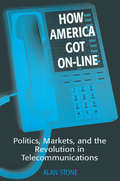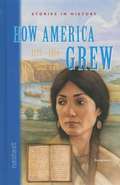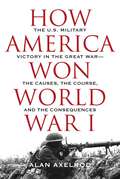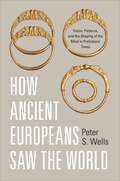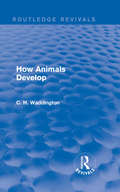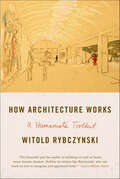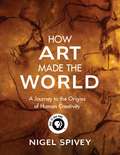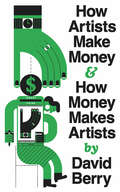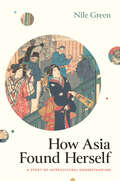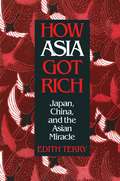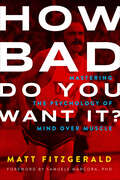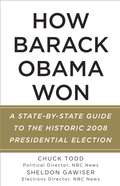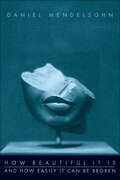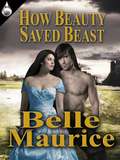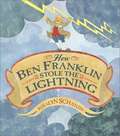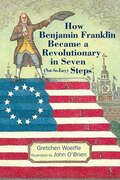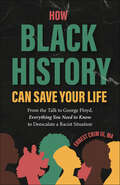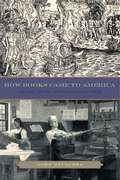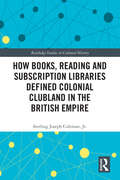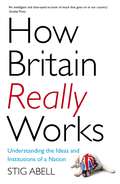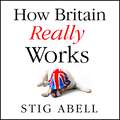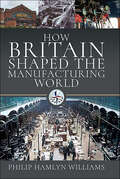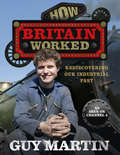- Table View
- List View
How America Got On-line: Politics, Markets, and the Revolution in Telecommunication
by Alan StoneThe telecommunications industry is the fastest growing sector of the US economy. This interdisciplinary study of technopolitical economics traces the industry's evolution from the invention of the telephone to the development of hypercommunications. Primary focus is on AT&T and its rivals.
How America Grew: 1775-1914
by Nextext Staff Mcdougal-Littell StaffA collection of stories based on historical events in the history of the United States from 1775-1914, including the Lewis and Clark expedition, the Civil War, and the building of the Panama Canal.
How America Won World War I
by Alan AxelrodImmediately after the armistice was signed in November, 1918, an American journalist asked Paul von Hindenburg who won the war against Germany. He was the chief of the German General Staff, co-architect with Erich Ludendorff of Germany&’s Eastern Front victories and its nearly war-winning Western Front offensives, and he did not hesitate in his answer. &“The American infantry,&” he said. He made it even more specific, telling the reporter that the final death blow for Germany was delivered by &“the American infantry in the Argonne.&” The British and the French often denigrated the American contribution to the war, but they had begged for US entry into the conflict, and their stake in America&’s victory was, if anything, even greater than that of the United States itself. But How America Won WWI will not litigate the points of view of Britain and France. The book will accepts as gospel the assessment of the top German leader whose job it had been to oppose the Americans directly - that the American infantry won the war - and this book will tell how the American infantry did it.
How Ancient Europeans Saw the World: Vision, Patterns, and the Shaping of the Mind in Prehistoric Times
by Peter S. WellsA revolutionary approach to how we view Europe's prehistoric cultureThe peoples who inhabited Europe during the two millennia before the Roman conquests had established urban centers, large-scale production of goods such as pottery and iron tools, a money economy, and elaborate rituals and ceremonies. Yet as Peter Wells argues here, the visual world of these late prehistoric communities was profoundly different from those of ancient Rome's literate civilization and today's industrialized societies. Drawing on startling new research in neuroscience and cognitive psychology, Wells reconstructs how the peoples of pre-Roman Europe saw the world and their place in it. He sheds new light on how they communicated their thoughts, feelings, and visual perceptions through the everyday tools they shaped, the pottery and metal ornaments they decorated, and the arrangements of objects they made in their ritual places—and how these forms and patterns in turn shaped their experience.How Ancient Europeans Saw the World offers a completely new approach to the study of Bronze Age and Iron Age Europe, and represents a major challenge to existing views about prehistoric cultures. The book demonstrates why we cannot interpret the structures that Europe's pre-Roman inhabitants built in the landscape, the ways they arranged their settlements and burial sites, or the complex patterning of their art on the basis of what these things look like to us. Rather, we must view these objects and visual patterns as they were meant to be seen by the ancient peoples who fashioned them.
How Animals Develop: A Short Account Of The Science Of Embryology - Primary Source Edition (Routledge Revivals: Selected Works of C. H. Waddington)
by C. H. WaddingtonFirst published in 1935 (this edition in 1946), this short account of the science of embryology was the first book in English to provide a simple outline of the whole of this important subject. The study of development is perhaps the best method of approach to the most fundamental of all biological problems, the problem of how all the diverse activities are integrated so as to make up a complete individual organism. The book gives a short sketch of the general pattern on which all animals are built, but devotes more attention to the factors which cause the development of the elements in the pattern, and which then bring them into correct relations with one another. This volume is simply written in order to enable the general reader to understand the revolutionary advances made in the subject at that time.
How Architecture Works: A Humanist's Toolkit
by Witold RybczynskiAn essential toolkit for understanding architecture as both art form and the setting for our everyday livesWe spend most of our days and nights in buildings, living and working and sometimes playing. Buildings often overawe us with their beauty. Architecture is both setting for our everyday lives and public art form—but it remains mysterious to most of us. In How Architecture Works, Witold Rybczynski, one of our best, most stylish critics and winner of the Vincent Scully Prize for his architectural writing, answers our most fundamental questions about how good—and not-so-good—buildings are designed and constructed. Introducing the reader to the rich and varied world of modern architecture, he takes us behind the scenes, revealing how architects as different as Frank Gehry, Renzo Piano, and Robert A. M. Stern envision and create their designs. He teaches us how to "read" plans, how buildings respond to their settings, and how the smallest detail—of a stair balustrade, for instance—can convey an architect's vision. Ranging widely from a war memorial in London to an opera house in St. Petersburg, from the National Museum of African American History and Culture in Washington, D.C., to a famous architect's private retreat in downtown Princeton, How Architecture Works, explains the central elements that make up good building design. It is an enlightening humanist's toolkit for thinking about the built environment and seeing it afresh. "Architecture, if it is any good, speaks to all of us," Rybczynski writes. This revelatory book is his grand tour of architecture today.
How Art Made the World: A Journey to the Origins of Human Creativity
by Nigel SpiveyIn the late nineteenth century, the first discoveries of prehistoric painting were greeted with incredulity. How could there have been such deft and skillful artists in the world over 30,000 years ago? Noted art historian Nigel Spivey begins with this puzzle to explore the record of humanity’s artistic endeavors and their impact on our own development. Embarking with the motto, "Everyone is an artist,” Spivey takes us on a quest to find out when and how we humans began to explore the deepest questions of life, using visual artforms. With the help of vivid color illustrations of some of the world’s most moving and enduring works of art, Spivey shows how that art has been used as a means of mass persuasion, essential to the creation of hierarchical societies, and finally, the extent to which art has served as a mode of terror management in the face of our inevitable death. Packed with new insights into ancient wonders and fascinating stories from all around the globe, How Art Made the World is a compelling account of how humans made art and how art makes us human.
How Artists Make Money and How Money Makes Artists
by David BerryHow artists make a living and how money changes artIt may not be the worst time in history to get paid to make art, but it certainly is the strangest. The institutions and markets that have been supporting the arts are undergoing massive changes, some even disappearing. Meanwhile the tools to make art and find audiences have never been more accessible, and there are more people than ever making art.How Artists Make Money and How Money Makes Artists is an attempt to reckon with the history of money in the arts — from Titian to Taylor Swift — and how that complicated relationship is changing. David Berry analyzes past and present financial dynamics in the arts to show the practicalities of how artists make a living and how that, in turn, affects the reception and perception of artists and their work: the impacts art has on wider society, how economic realities affect aesthetic judgements of art, what kind of people are able to work as artists, and how political and cultural ideas about the nature of art affect what kind of resources are made available to it.David Berry explores how art has become central to our understanding of humanity by tying art to what makes the world go round: money. Along the way, he challenges popular ideas of what constitutes a successful artistic career and considers what our treatment of artists says about us.
How Asia Found Herself: A Story of Intercultural Understanding
by Nile GreenA pioneering history of cross-cultural knowledge that exposes enduring fractures in unity across the world&’s largest continent The nineteenth century saw European empires build vast transport networks to maximize their profits from trade, and it saw Christian missionaries spread printing across Asia to bring Bibles to the colonized. The unintended consequence was an Asian communications revolution: the maritime public sphere expanded from Istanbul to Yokohama. From all corners of the continent, curious individuals confronted the challenges of studying each other&’s cultures by using the infrastructure of empire for their own exploratory ends. Whether in Japanese or Persian, Bengali or Arabic, they wrote travelogues, histories, and phrasebooks to chart the vastly different regions that European geographers labeled "Asia." Yet comprehension does not always keep pace with connection. Far from flowing smoothly, inter-Asian understanding faced obstacles of many kinds, especially on a landmass with so many scripts and languages. Here is the dramatic story of cross-cultural knowledge on the world&’s largest continent, exposing the roots of enduring fractures in Asian unity.
How Asia Got Rich: Japan, China and the Asian Miracle
by Edith TerryWithin a few short months in 1997, Asian economies that had been considered not only healthy but "miraculous" suddenly fell off a precipice as investors withdrew massively first from Asian currencies and, in rapid order, from equity markets across the region. On October 27 1997, the turmoil in Asian markets spooked Wall Street in the largest single-day decline in history, a drop of 550 points. It was predicted that the Asian crash could drive the US trade deficit from $191 billion to $300 billion by 1998, creating huge new tensions in relations with some of the largest US trading partners. These wrenching changes, following a generation of success, raise numerous questions about the steps that led to the crisis, its likely outcome and the limits and constraints of "Asian capitalism". Edith Terry presents a blow-by-blow account of the crisis, beginning with the 1996 collapse of the Bangkok Bank of Commerce. In her overview, she links the fall of the Asian miracle with the theme of globalization, arguing that the crisis demonstrates the urgency of dismantling restraints to trade, investment, and financial services, and that the United States should take leadership in pushing for new and sweeping reform through the World Trade Organization and in bilateral negotiations with its trading partners. The final section of the book deals with the rise of the "Asian miracle" - how the myth was created, who created it, why it succeeded for so long - and is informed by analysis of the Japanese prototype.
How Bad Do You Want It?: Mastering the Psychology of Mind over Muscle
by Matt FitzgeraldThe greatest athletic performances spring from the mind, not the body.Elite athletes have known this for decades and now science is learning why it’s true. In his fascinating new book How Bad Do You Want It?, coach Matt Fitzgerald examines more than a dozen pivotal races to discover the surprising ways elite athletes strengthen their mental toughness.Fitzgerald puts you into the pulse-pounding action of more than a dozen epic races from running, cycling, triathlon, XTERRA, and rowing with thrilling race reports and revealing post-race interviews with the elites. Their own words reinforce what the research has found: strong mental fitness lets us approach our true physical limits, giving us an edge over physically stronger competitors. Each chapter explores the how and why of an elite athlete’s transformative moment, revealing powerful new psychobiological principles you can practice to flex your own mental fitness.The new psychobiological model of endurance performance shows that the most important question in endurance sports is: how bad do you want it? Fitzgerald’s fascinating book will forever change how you answer this question and show you how to master the psychology of mind over muscle. These lessons will help you push back your limits and uncover your full potential.How Bad Do You Want It? reveals new psychobiological findings including:Mental toughness determines how close you can get to your physical limit.Bracing yourself for a tough race or workout can boost performance by 15% or more.Champions have learned how to give more of what they have.The only way to improve performance is by altering how you perceive effort.Choking under pressure is a form of self-consciousness.Your attitude in daily life is the same one you bring to sports.There’s no such thing as going as fast as you can—only going faster than before.The fastest racecourse is the one with the loudest spectators.Faith in your training is as important as the training itself.Athletes featured in How Bad Do You Want It?: Sammy Wanjiru, Jenny Simpson, Greg LeMond, Siri Lindley, Willie Stewart, Cadel Evans, Nathan Cohen and Joe Sullivan, Paula Newby-Fraser, Ryan Vail, Thomas Voeckler, Ned Overend, Steve Prefontaine, and last of all John “The Penguin” Bingham
How Barack Obama Won: A State-by-State Guide to the Historic 2008 Presidential Election
by Chuck Todd Sheldon GawiserThis detailed overview and analysis of the results of Barack Obama's historic 2008 presidential win gives us the inside state-by-state guide to how Obama achieved his victory, and allows us to see where the country stood four years ago. Although much has changed in the nearly four years since, How Barack Obama Won remains the essential guide to Obama's electoral strengths and offers important perspective on his 2012 bid. The votes in each state for Obama and McCain are broken down by percentage according to gender, age, race, party, religious affiliation, education, household income, size of city, and according to views about the most important issues (the economy, terrorism, Iraq, energy, healthcare), the future of the economy (worried, not worried) and the war in Iraq (approve, disapprove).
How Beautiful It Is And How Easily It Can Be Broken: Essays
by Daniel MendelsohnThe New York Times–bestselling critic uses his training as a classicist to tackle contemporary films, theater, literature, and more in 30 elegant essays.Whether he’s on Broadway or at the movies, considering a new bestseller or revisiting a literary classic, Daniel Mendelsohn’s judgments over the past fifteen years have provoked and dazzled with their deep erudition, disarming emotionality, and tart wit. Now How Beautiful It Is and How Easily It Can Be Broken reveals all at once the enormous stature of Mendelsohn’s achievement and demonstrates why he is considered one of our greatest critics. Writing with a lively intelligence and arresting originality, he brings his distinctive combination of scholarly rigor and conversational ease to bear across eras, cultures, and genres, from Roman games to video games.His interpretations of our most talked-about films—from the work of Pedro Almodóvar to Brokeback Mountain, from United 93 and World Trade Center to 300, Marie Antoinette, and The Hours—have sparked debate and changed the way we watch movies. Just as stunning and influential are his dispatches on theater and literature, from The Producers to Jeffrey Eugenides' Middlesex, from The Lovely Bones to the works of Harold Pinter. Together these thirty brilliant and engaging essays passionately articulate the themes that have made Daniel Mendelsohn a crucial voice in today’s cultural conversation: the aesthetic and indeed political dangers of imposing contemporary attitudes on the great classics; the ruinous effect of sentimentality on the national consciousness in the post-9/11 world; the vital importance of the great literature of the past for a meaningful life in the present.How Beautiful It Is and How Easily It Can Be Broken makes it clear that no other contemporary thinker is as engaged with as many aspects of our culture and its influences as Mendelsohn is, and no one practices the vanishing art of popular criticism with more acuity, humor, and feeling.Praise for How Beautiful It Is and How Easily It Can Be Broken “These essays richly repay the time readers spend in their company.” —Publishers Weekly (starred review)“Like fine banquet fare: Some items to be wolfed down, some savored slowly, some best stored in the fridge for a later day.” —Kirkus Reviews
How Beauty Saved Beast
by Belle MauriceThis adult fairy tale has all the classics - a curse, a beast, and the beautiful woman destined to save him . . . or does it?Cursed with insatiable lust and slowly transforming into a beast, the master of the castle sends his gamekeeper out to the nearby villages to choose girls to satisfy him. When the gamekeeper chooses her sister, Serena offers herself instead and is swept away to the castle, sure she will be driven mad by the Beast's demands.Except his demands are not so unwelcome, and Serena finds herself wanting to please him, confusing the Beast, and then terrifying him. If he gives her his heart, he will only lose it when he finally transforms and she abandons him. Why bring on more pain? She is there to be used, nothing more. But Serena refuses to be just an object for sexual satisfaction.She wants to be everything to the Beast. She wants him to love her.
How Ben Franklin Stole the Lightning
by Rosalyn SchanzerBen Franklin was the most famous American in the entire world during colonial times. No wonder! After all, the man could do just about anything. Why, he was an author and an athlete and a patriot and a scientist and an inventor to boot. He even found a way to steal the lightning right out of the sky.<P><P> Is such a thing possible? Is it. Take a look inside and find Ben busy at work on every spread. Then find out how he used his discovery about lightning to make people's lives safer.<P> In an inventive way, Rosalyn Schanzer brings us a brilliant and ever-curious American original.
How Benjamin Franklin Became a Revolutionary in Seven (Not-So-Easy) Steps
by Gretchen WoelfleHow did Ben Franklin become an outspoken leader of the American Revolution? Learn all about it in seven (not-so-easy) steps in this humorous, accessible middle-grade chapter book that focuses on Ben&’s political awakening.Famous founding father Benjamin Franklin was a proud subject of the British Empire—until he wasn&’t. It took nearly seventy years and seven not-so-easy steps to turn Benjamin Franklin from a loyal British subject to a British traitor—and a fired-up American revolutionary. In this light, whimsical narrative, young readers learn how Franklin came to be a rebel, beginning with his childhood lesson in street smarts when he buys a whistle at an inflated price. Franklin is a defiant boy who runs away from his apprenticeship, and while he becomes a deep thinker, a brilliant scientist, and a persuasive writer when he grows up, he never loses that spark. As a community leader who tries his best to promote peace and unity both between the colonies and with Great Britain, he becomes more and more convinced that independence for the American colonies is the way forward.Illustrated throughout with art by noted New Yorker cartoonist and illustrator John O&’Brien and sprinkled with quotations from Franklin, this unfamiliar story of a familiar figure in American history will surprise and delight young readers.
How Black History Can Save Your Life: Belonging at the Breaking Point
by Ernest Crim IIIBlack History's Power to Combat RacismHow Black History Can Save Your Life by Ernest Crim III, a hate crime survivor and Anti-Racist Educator, is an essential guide for anyone seeking to combat interpersonal racism, understand the roots of discrimination, and gain actionable strategies through Black historical narratives. This black history book for adults book empowers individuals, parents, and educators with tools to challenge racism and foster equity in their communities.Using Black history to fight racism. This book builds on Crim's personal experiences, including a viral 2016 hate crime incident that profoundly shaped his career. During a night out, Crim was targeted with racial slurs, but instead of letting it defeat him, he used the situation to highlight the pervasive nature of racism in America. He captured the moment on video, sparking a national conversation about the importance of confronting and addressing discrimination. Reclaiming the stories of Black history. Crim delves deep into the stories of Black excellence, resistance, and perseverance. He equips families, parents, and educators with the tools they need to combat racism in everyday life and within schools. Through his lens as a parent and former teacher, Crim demonstrates how the untold stories of Black history hold the keys to understanding the roots of racism and how it can be untaught. Drawing on his two bestsellers—Black History Saved My Life and The ABCs of Affirming Black Children—Crim teaches readers how to deconstruct racist systems and foster equitable practices in their communities. Inside, you&’ll find: Strategies to de-escalate and combat interpersonal racism in everyday situations. Tools for parents and educators to address racism in schools and educate children through an equitable lens. Inspiring Black history stories that provide a blueprint for resilience and empowerment in the face of discrimination. If you liked The Color of Law, Stamped from the Beginning, or Seven Sisters and a Brother, you&’ll love How Black History Can Save Your Life.
How Books Came to America: The Rise of the American Book Trade (Penn State Series in the History of the Book #17)
by John HruschkaAnyone who pays attention to the popular press knows that the new media will soon make books obsolete. But predicting the imminent demise of the book is nothing new. At the beginning of the twentieth century, for example, some critics predicted that the electro-mechanical phonograph would soon make books obsolete. Still, despite the challenges of a century and a half of new media, books remain popular, with Americans purchasing more than eight million books each day. In How Books Came to America, John Hruschka traces the development of the American book trade from the moment of European contact with the Americas, through the growth of regional book trades in the early English colonial cities, to the more or less unified national book trade that emerged after the American Civil War and flourished in the twentieth century. He examines the variety of technological, historical, cultural, political, and personal forces that shaped the American book trade, paying particular attention to the contributions of the German bookseller Frederick Leypoldt and his journal, Publishers Weekly.Unlike many studies of the book business, How Books Came to America is more concerned with business than it is with books. Its focus is on how books are manufactured and sold, rather than how they are written and read. It is, nevertheless, the story of the people who created and influenced the book business in the colonies and the United States. Famous names in the American book trade—Benjamin Franklin, Robert Hoe, the Harpers, Henry Holt, and Melvil Dewey—are joined by more obscure names like Joseph Glover, Conrad Beissel, and the aforementioned Frederick Leypoldt. Together, they made the American book trade the unique commercial institution it is today.
How Books Came to America: The Rise of the American Book Trade (Penn State Series in the History of the Book)
by John HruschkaAnyone who pays attention to the popular press knows that the new media will soon make books obsolete. But predicting the imminent demise of the book is nothing new. At the beginning of the twentieth century, for example, some critics predicted that the electro-mechanical phonograph would soon make books obsolete. Still, despite the challenges of a century and a half of new media, books remain popular, with Americans purchasing more than eight million books each day. In How Books Came to America, John Hruschka traces the development of the American book trade from the moment of European contact with the Americas, through the growth of regional book trades in the early English colonial cities, to the more or less unified national book trade that emerged after the American Civil War and flourished in the twentieth century. He examines the variety of technological, historical, cultural, political, and personal forces that shaped the American book trade, paying particular attention to the contributions of the German bookseller Frederick Leypoldt and his journal, Publishers Weekly.Unlike many studies of the book business, How Books Came to America is more concerned with business than it is with books. Its focus is on how books are manufactured and sold, rather than how they are written and read. It is, nevertheless, the story of the people who created and influenced the book business in the colonies and the United States. Famous names in the American book trade—Benjamin Franklin, Robert Hoe, the Harpers, Henry Holt, and Melvil Dewey—are joined by more obscure names like Joseph Glover, Conrad Beissel, and the aforementioned Frederick Leypoldt. Together, they made the American book trade the unique commercial institution it is today.
How Books, Reading and Subscription Libraries Defined Colonial Clubland in the British Empire (Routledge Studies in Cultural History #86)
by Sterling Joseph Coleman, Jr.How Books, Reading and Subscription Libraries Defined Colonial Clubland in the British Empire argues that within an entangled web of imperial, colonial and book trade networks books, reading and subscription libraries contributed to a core and peripheral criteria of clubbability used by the "select people"—clubbable settler elite—to vet the "proper sort"—clubbable indigenous elite—as they culturally, economically and socially navigated their way towards membership in colonial clubland. As a microcosm for British-controlled areas of the Caribbean, Asia and Africa, this book assesses the history, membership, growth and collection development of three colonial subscription libraries—the Penang Library in Malaysia, the General Library of the Institute of Jamaica and the Lagos Library in Nigeria—during the nineteenth and twentieth centuries. This work also examines the places these libraries occupied within the lives of their subscribers, and how the British Council reorganized these colonial subscription libraries to ensure their survival and the survival of colonial clubland in a post-colonial world. This book is designed to accommodate historians of Britain and its empire who are unfamiliar with library history, library historians who are unfamiliar with British history, and book historians who are unfamiliar with both topics.
How Britain Really Works: Understanding the Ideas and Institutions of a Nation
by Stig Abell'Absorbing . . . an intelligent and clear-eyed account of much that goes on in our country' Sunday TimesGetting to grips with Great Britain is harder than ever. We are a nation that chose Brexit, rejects immigration but is dependent on it, is getting older but less healthy, is more demanding of public services but less willing to pay for them, is tired of intervention abroad but wants to remain a global authority. We have an over-stretched, free health service (an idea from the 1940s that may not survive the 2020s), overcrowded prisons, a military without an evident purpose, an education system the envy of none of the Western world. How did we get here and where are we going?How Britain Really Works is a guide to Britain and its institutions (the economy, the military, schools, hospitals, the media, and more), which explains just how we got to wherever it is we are. It will not tell you what opinions to have, but will give you the information to help you reach your own. By the end, you will know how Britain works - or doesn't.'Stig Abell is an urbane, and often jaunty guide to modern Britain, in the mould of Bill Bryson' Irish Times
How Britain Really Works: Understanding the Ideas and Institutions of a Nation
by Stig Abell'Absorbing . . . an intelligent and clear-eyed account of much that goes on in our country' Sunday TimesGetting to grips with Great Britain is harder than ever. We are a nation that chose Brexit, rejects immigration but is dependent on it, is getting older but less healthy, is more demanding of public services but less willing to pay for them, is tired of intervention abroad but wants to remain a global authority. We have an over-stretched, free health service (an idea from the 1940s that may not survive the 2020s), overcrowded prisons, a military without an evident purpose, an education system the envy of none of the Western world. How did we get here and where are we going?How Britain Really Works is a guide to Britain and its institutions (the economy, the military, schools, hospitals, the media, and more), which explains just how we got to wherever it is we are. It will not tell you what opinions to have, but will give you the information to help you reach your own. By the end, you will know how Britain works - or doesn't.'Stig Abell is an urbane, and often jaunty guide to modern Britain, in the mould of Bill Bryson' Irish Times
How Britain Really Works: Understanding the Ideas and Institutions of a Nation
by Stig Abell'Absorbing . . . an intelligent and clear-eyed account of much that goes on in our country' Sunday Times'Wry and readable' GuardianGetting to grips with Great Britain is harder than ever. We are a nation that chose Brexit, rejects immigration but is dependent on it, is getting older but less healthy, is more demanding of public services but less willing to pay for them, is tired of intervention abroad but wants to remain a global authority. We have an over-stretched, free health service (an idea from the 1940s that may not survive the 2020s), overcrowded prisons, a military without an evident purpose, an education system the envy of none of the Western world. How did we get here and where are we going?How Britain Really Works is a guide to Britain and its institutions (the economy, the military, schools, hospitals, the media, and more), which explains just how we got to wherever it is we are. It will not tell you what opinions to have, but will give you the information to help you reach your own. By the end, you will know how Britain works - or doesn't.'Stig Abell is an urbane, and often jaunty guide to modern Britain, in the mould of Bill Bryson' Irish Times
How Britain Shaped the Manufacturing World, 1851–1951: 1851 - 1951
by Philip Hamlyn WilliamsThe peoples of the British Isles gave to the world the foundations on which modern manufacturing economies are built. This is quite an assertion, but history shows that, in the late eighteenth century, a remarkable combination of factors and circumstances combined to give birth to Britain as the first manufacturing nation. Further factors allowed it to remain top manufacturing dog well into the twentieth century while other countries were busy playing catch up. Through two world wars and the surrounding years, British manufacturing remained strong, albeit while ceding the lead to the United States. This book seeks to tell the remarkable story of British manufacturing, using the Great Exhibition of 1851 as a prism. Prince Albert and Sir Henry Cole had conceived an idea of bringing together exhibits from manufacturers across the world to show to its many millions of visitors the pre-eminence of the British. 1851 was not the start, but rather a pause for a bask in glory. This book traces back from the exhibits in Hyde Park’s Crystal Palace to identify the factors that gave rise to this pre-eminence, then follows developments up until the Festival of Britain exactly one century later. Steam power and communication by electric telegraph, both British inventions, predated the Exhibition. After it came the sewing machine and bicycle, motor car and aeroplane, but also electrical power, radio and the chemical and pharmaceutical industries where Britain played a leading part.
How Britain Worked
by Guy MartinIt is a largely forgotten fact that Britain was the first industrialized country in the world, but Guy Martin - the cult motorcycle racer and mechanic - is about to remind us how the industrial revolution helped make Britain great. Guy shows how the discoveries made in the late 18th-19th centuries are to thank for the ease of our every day lives: in order to cook a bacon and egg sandwich in Industrial-era conditions, Guy has to restore a steam locomotive and railway to have the components delivered to the local shop; he has to bring a saw mill back into working order to be able to make a bicycle; he has to revamp a Victorian fishing trawler so he can cook himself some fish and chips, and when he decides to mow the lawn, he restores a Victorian botanical garden. After all that, he's in need of a holiday - so he sets to work restoring a Victorian holiday resort. Illustrated throughout with specially commissioned photography as well as historical images, Guy will take us through each project; his passion, enthusiasm and sheer inventiveness bringing a completely new perspective to the Industrial Revolution. He invites us to live it with him, to enjoy the nostalgia, marvel in the mechanics and learn from its legacy.
